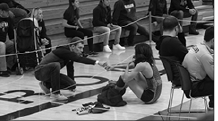Getting Players’ Heads in the Game

Visualisation, deep breathing and positive affirmations are all types of mental training.
Olympians can be seen visualising before an event, seeing and feeling what they will do before it’s their time to compete. Many athletes praise mental training while some are not aware of the process at all.
Mental training in sports is a way to enhance confidence, motivation and focus. Though it’s most common in individual sports, it can be used in team sports to enhance the individual athlete’s mental-awareness. This can raise the question: how do Kaneland coaches use mental training to enhance their athleres performance?
Wrestling coach, Kenneth Paoli uses mental training as a way to prepare his athletes for their competitions.
“We talk to them [the wrestlers] about being mentally tough, what that looks like and, how to get through things that are tough. And then we try to make it more of a life lesson than a physical lesson,” Paoli said.
According to the author of “Using Your Head to Wrestle Like a Champion,” Dr. Alan Goldberg, being successful in wrestling practice means having 95% physical skills and 5% mental skills. However, once it comes time to compete, those roles reverse. Goldberg is the author of 35 mental toughness books and has worked with Olympians for the past 32 years.
Paoli has witnessed the effects that nerves can have on his athletes firsthand.
“I’ve seen many athletes that were great physically and looked really good at practice and then come game time, they’d go out to wrestle on the mat and you can tell mentally, something went wrong. They’d start doing things that they don’t do in practice, and they stop performing well,” Paoli said
Since Paoli seeing these problems occur, he’s introduced mental training to his athlete’s practices.
“A lot of what we do in the wrestling room is goal setting and having a long term goal. Literally, I tell kids to talk to themselves and push through things that are hard and difficult and see the light at the end of the tunnel rather than just giving up because its hard in the moment,” Paoli said.
Along with positive affirmations, Paoli also teaches a visualization technique they call “shadow wrestling,” It’s a way of having a set plan before going out onto the mat. The athletes practice how they would react to their opponent along with how they would complete different set-ups.
While Paoli might use positive affrimations and shadow wresling cross Country coach, Doug Ecker prepares his athletes in a different way.
Ecker is more about having his athletes learn and grow on their own. He does not use mental training like Paoli because he feels it does not work for everyone.
“Everybody is different you know, you can put 30 people in a room and it will vary on what works and doesn’t work for them,” Ecker said.
Ecker tries his best to have minimal communication with the runners on the day of the race so he is not in his athletes way. He teaches his athletes not to compare themselves to their competition and to always have a plan before competing.
“I think there is a lot of ways you can prepare with people mentally, but I think it’s important to be positive, to realize you’re going to fail much more than you are going to succeed,” Ecker said.
Visualisation, deep breathing and positive affirmations are all types of mental training.
Olympians can be seen visualising before an event, seeing and feeling what they will do before it’s their time to compete. Many athletes praise mental training while some are not aware of the process at all.
Mental training in sports is a way to enhance confidence, motivation and focus. Though it’s most common in individual sports, it can be used in team sports to enhance the individual athlete’s mental-awareness. This can raise the question: how do Kaneland coaches use mental training to enhance their athleres performance?
Wrestling coach, Kenneth Paoli uses mental training as a way to prepare his athletes for their competitions.
“We talk to them [the wrestlers] about being mentally tough, what that looks like and, how to get through things that are tough. And then we try to make it more of a life lesson than a physical lesson,” Paoli said.
According to the author of “Using Your Head to Wrestle Like a Champion,” Dr. Alan Goldberg, being successful in wrestling practice means having 95% physical skills and 5% mental skills. However, once it comes time to compete, those roles reverse. Goldberg is the author of 35 mental toughness books and has worked with Olympians for the past 32 years.
Paoli has witnessed the effects that nerves can have on his athletes firsthand.
“I’ve seen many athletes that were great physically and looked really good at practice and then come game time, they’d go out to wrestle on the mat and you can tell mentally, something went wrong. They’d start doing things that they don’t do in practice, and they stop performing well,” Paoli said.
Since Paoli seeing these problems occur, he’s introduced mental training to his athlete’s practices.
“A lot of what we do in the wrestling room is goal setting and having a long term goal. Literally, I tell kids to talk to themselves and push through things that are hard and difficult and see the light at the end of the tunnel rather than just giving up because its hard in the moment,” Paoli said.
Along with positive affirmations, Paoli also teaches a visualization technique they call “shadow wrestling,” It’s a way of having a set plan before going out onto the mat. The athletes practice how they would react to their opponent along with how they would complete different set-ups.
While Paoli might use positive affrimations and shadow wresling cross Country coach, Doug Ecker prepares his athletes in a different way.
Ecker is more about having his athletes learn and grow on their own. He does not use mental training like Paoli because he feels it does not work for everyone.
“Everybody is different you know, you can put 30 people in a room and it will vary on what works and doesn’t work for them,” Ecker said
Ecker tries his best to have minimal communication with the runners on the day of the race so he is not in his athletes way. He teaches his athletes not to compare themselves to their competition and to always have a plan before competing.
“I think there is a lot of ways you can prepare with people mentally, but I think it’s important to be positive, to realize you’re going to fail much more than you are going to succeed,” Ecker said.




